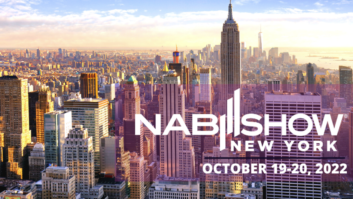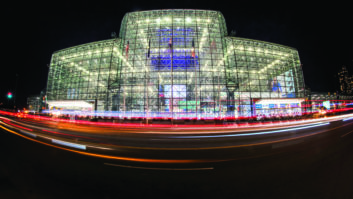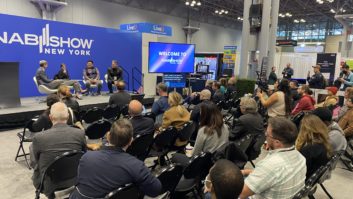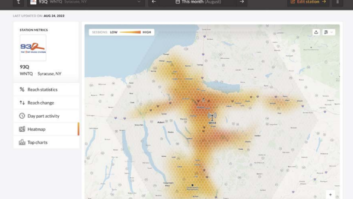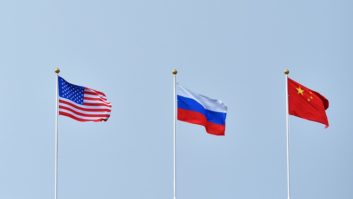The FCC gave interested parties additional time over the holidays to comment on new rules proposed to strengthen the process for identifying governmental entities sponsorship of programming. Now, it is getting an earful from a couple of broadcast industry trade groups.
The National Association of Broadcasters and Multicultural Media, Telecom and Internet Council (MMTC) used that extra time to compile a 47-page joint filing. Submitted this week, the filing asks the FCC to alter course and bring its current and proposed foreign sponsorship identification regulations within the bounds of law and reduce the overall unnecessary burdens of its rules.
The FCC’s Second Notice of Proposed Rulemaking (NPRM) released last fall seeks to further regulate foreign-sponsored programming on U.S. radio and television, requiring deeper background verifications by broadcasters of programming it airs. The proposal sought comment on a first-of-its kind requirement that broadcasters and lessees make certifications of compliance using FCC-specified language and place the certifications in stations’ online public inspection files.
The NAB told Radio World in an email: “As NAB has made clear, we share the FCC’s goal of ensuring that the public understands when it is watching or listening to foreign government-sponsored propaganda. While there are very few instances of this type of programming airing, we continue to work with the commission to right-size its rules concerning on-air identification.
“The FCC can achieve its goals by placing regulatory burdens only on those airing such programming rather than the entire industry. The vast majority of broadcasters never has and never will air propaganda on behalf of a foreign government.”
In their comments, the NAB and MMTC said they believe the FCC lacks the power to regulate lessee disclosures and impose the proposed certifications requirements on lessees.
“The approach taken to (defining) reasonable diligence under the existing rules and expanded upon by the notice’s proposals is beyond the FCC’s statutory authority and places unjustifiable – and even unconstitutional – burdens on stations and lessees that do not and never will air foreign propaganda,” the NAB and MMTC commented.
[Related: “FCC Proposes Modifications to Foreign ID Requirements“]
In addition, the groups say the FCC’s proposed rules would violate the 1934 Communications Act, which already requires broadcasters to declare who paid and furnished programming of any sponsored program. The FCC wants broadcasters to gather more information on programming suppliers partly due to increased concerns that the Chinese and Russian governments have stepped up efforts to broadcast propaganda on U.S. stations.
This is the FCC’s second recent attempt to more tightly regulate foreign-sponsored programming on radio and television. A federal appeals court in July 2022 tossed the FCC’s first try at adopting new disclosure requirements saying the FCC went too far and had no authority to impose a verification requirement, but stopped short of deciding the First Amendment claims raised by NAB.
NAB and MMTC contend the FCC foreign sponsorship identification rules enacted in April 2021 — which required broadcasters check federal sources to verify sponsors’ identities, but later tossed by the court decision — has nonetheless resulted in “thousands of stations that have never aired such content spending untold hours and dollars education their employees about foreign sponsorship ID requirements, integrating the required diligence steps into their online or print transaction processes, investigating tens of thousands of program sponsors for fear the FCC might consider them lessees, and documenting those investigations.”
The broadcast industry trade groups add: “As always, the commission must ensure that the burden imposed by its rules is proportionate to the conduct it is seeking to prevent. The FCC’s sparse record includes less than a handful of reports – some quite dated – of only a few stations that have aired foreign propaganda.”
[Sign Up for Radio World’s SmartBrief Newsletter]
The NAB and MMTC comments included examples of what some broadcasters told them about the costs and burdens of ID sponsorship compliance:
- One broadcaster with a mix of television and radio stations estimates it has already spent $10,000-$15,000 on outside counsel and has devoted significant in-house counsel and paralegal resources to foreign sponsorship ID compliance (including requesting, collecting, recording, and tracking lessee information).
- Another group of television stations estimates that in-house counsel is spending 20 hours per quarter on foreign sponsorship identification compliance (the equivalent of two full business weeks per year).
- At least one broadcast group has implemented a new process to restrict individual stations within the group from entering or renewing any arrangement which could be deemed a lease without legal review.
In its most recent comments, the NAB and MMTC ask the FCC to grant a pending request for clarification of the scope of the term “lease” in the foreign sponsorship identification rules filed by several television affiliates associations. That petition asks the FCC to clarify that advertising of any length and format for commercial products and services does not constitute a lease.
The two groups also say two kinds of programming should be excluded from the commission’s existing and proposed “reasonable diligence” criteria: “First, the commission should exclude from its definition of leases or otherwise exempt from its existing and proposed diligence standards all faith-based programming, including content produced and distributed by houses of worship or other entities that lease time to air faith-based programming. Second, the commission should exempt locally produced and distributed programming, such as local sporting events, from the rule’s purview.”
The reply comment deadline is Jan. 24. Comments on MB Docket 20-299 can be filed using the commission’s online system.





